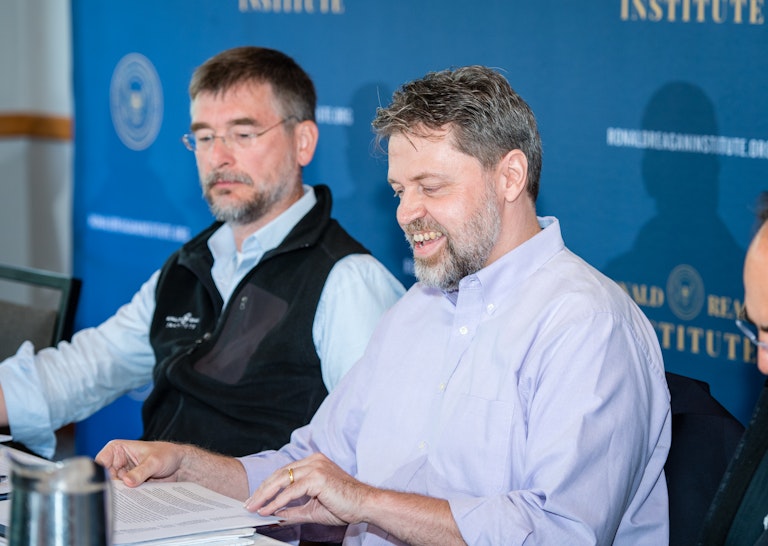Ronald Reagan Institute
Democracy and Authoritarianism: How Should Values Matter in Foreign Policy? A Response from Colin Dueck
By Colin Dueck

A Response from Colin Dueck
It’s a pleasure to be asked to respond to Daniel Twining’s paper for the Reagan Institute on the subject of democratic values and conservative foreign policy. Twining identifies some of the most important international challenges facing the United States today, and he is right on a number of key points.
“Conservatives could do far worse than to remember the guideline laid out by the nation’s first president: ‘Our interest, guided by justice.’”
China and Russia really are attempting to revise and expand their own authoritarian spheres of influence against the United States, using a wide variety of policy tools and instruments. As identified in key Trump administration documents including the 2017 National Security Strategy and 2018 National Defense Strategy, the United States is thus faced with a new era of great power competition—and not by its own choosing. Twining is correct in suggesting that the United States must face this challenge in all of its ramifications. He is especially persuasive in some details on the disturbing phenomenon of Chinese Communist Party influence operations within existing democracies.
Having said that, Twining’s paper raises a number of questions regarding precisely how to meet all of these challenges.
1. How is this conservative? Within the United States, both conservatives and liberals tend to agree that in the abstract it would be a good thing to see the spread of popular self- government overseas. American liberals tend to be optimistic that this can and will be achieved through a heavy reliance on multilateral institutions, cultural exchange, peaceful diplomacy, soft power, complex interdependence, the avoidance of unilateral action, and the verbal reiteration of liberal norms. Presumably what American conservatives bring to the table is a more hard-nosed and realistic approach. It would be useful if Twining could outline some of those differences. 2. To what values do we refer? The paper takes for granted the promotion of democracy and human rights abroad as core American values. It does not specify which human rights are of central interest to U.S. foreign policy. The tendency over the years has been for the international community to expand the definitions of such rights, even as it often fails to respect them. A more focused definition of human rights would be helpful. For example, is the promotion of LGBTQ rights overseas a core American value, central to a conservative foreign policy? If so, why? 3. Are we willing to admit policy trade-offs? One indicator of a useful and realistic foreign policy framework is its willingness to admit and face up to genuine trade-offs. No doubt the universal promotion of democracy and human rights is an admirable goal. But in specific cases, depending upon the time and the place, there may also be other worthwhile foreign policy goals at stake, and in practical terms, these goals may sometimes be in conflict with one another. A simple declaration that American interests and liberal values are no longer in tension historically is not helpful in this regard. The well-intentioned desire to emphasize human rights, for example, may come into conflict with the promotion of U.S. economic and/or security interests in relation to multiple countries. A flat denial that such trade- offs exist is an improbable starting point for American foreign policy strategy. 4. How should we approach undemocratic allies? In the past, the United States has not prevailed against great power authoritarian competitors by insisting that it would only ally with other democracies. If it had, it might have lost those competitions. In multiple real-world cases, the United States possesses formal or informal allied and partner regimes that are either semidemocratic or frankly autocratic in nature. The belief that we should push these allies to be more democratic is no doubt genuine. But how exactly should this pressure be exercised, without leading to outcomes even worse from the perspective of U.S. interests, including, for example, the triumph of radical and/or anti-American insurgents? The dilemma was well highlighted by a leading neoconservative of the 1970s and 1980s, Jeane Kirkpatrick, when she noted: Hurried efforts to force complex and unfamiliar practices on societies lacking the requisite political culture … not only fail to produce the desired outcome, if they are undertaken at a time when the traditional regime is under attack, they actually facilitate the job of the insurgents. 5. How can we fight salafi-jihadist terrorists without naming them? Both Twining and the Trump administration are right to name China and Russia as authoritarian great power competitors of the United States. This is more than the Obama administration was willing to do. Unfortunately, transnational networks of salafi-jihadist terrorists, including ISIS, Al Qaeda, and regional affiliates, continue to wage war—by their own choice—on the United States, its civilians, and its allies. The challenge is not violent extremism, per se. Rather, it is specific groups of human beings with hostile intent toward the United States. We cannot develop satisfactory strategies to counteract these enemies if we cannot bring ourselves to identify them. To locate, capture, turn, or kill would-be suicide bombers who intend to murder innocent civilians ought to be considered of value. 6. How should a conservative foreign policy address uncontrolled mass migration? Twining correctly identifies uncontrolled mass migration as a grave challenge for the United States and many of its allies, with foreign policy implications. He proposes to address this challenge at its source, by addressing the root causes of migration out of war-torn and impoverished countries. Again, this is a commendable goal. But U.S. and allied efforts to help combat poor governance, corruption, organized crime, and civil conflict in various target countries have had only partial success in recent years, and in the meantime, uncontrolled mass migration continues. Twining does not mention any other possible solutions. But since the subject has been raised, we might suggest that treating the borders of the United States as actual borders is not an unreasonable proposition. The challenge of tackling uncontrolled mass migration cannot be addressed only by targeting domestic conditions in other countries. It must also be addressed through sensible immigration policy reforms within the United States and through strengthened U.S. border security. 7. What is the example set by Ronald Reagan? The Reagan Institute rightly looks to the 40th president’s administration as a good example of how to promote democratic values in U.S. foreign policy. In doing so, we need to remember the real Reagan. President Reagan believed in the eventual spread of popular self-government internationally, and in his case, this belief went bone-deep. In practice, however, Reagan was successful precisely because he generally had a good feeling for how and when to push U.S. allies on the issue of their own domestic liberalization and when to support them against common threats. Reagan’s starting instinct was always to support U.S. allies and partners against anti-American radicals. As he put it in 1980: “The basis of a free and principled foreign policy is one that takes the world as it is, and seeks to change it by leadership and example; not by harangue, harassment or wishful thinking.”
Daniel Twining’s useful essay provides a good starting point for discussion on the subject of the proper place of values in a conservative American foreign policy. No doubt there will be many points of agreement here, including around the need for strong national defenses, robust counterterrorism, expansive American trade, firm alliances, and coordinated strategies of counterpressure against Moscow and Beijing.
The hard point comes when Americans are asked to formulate case-specific policies in particular times and places where autocratic or semi-autocratic regimes are nevertheless allied to the United States against greater authoritarian threats. In such cases, conservatives could do far worse than to remember the guideline laid out by the nation’s first president: “Our interest, guided by justice.”
"The Future of Conservative Internationalism," which is a collection of essays from the Reagan Institute Strategy Group, convened in Beaver Creek, Colorado, in July 2019.
Join Our Newsletter
Never miss an update.
Get the latest news, events, publications, and more from the Reagan Institute delivered right to your inbox.
